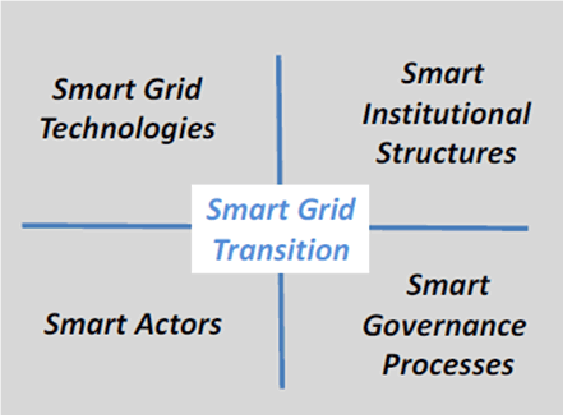ISGAN Annex 7: Smart Grid Transitions – on Institutional Change
Short Description
As pointed out in the Technology Roadmap Smart Grids of the International Energy Agency (OECD/IEA 2011), Smart Grids will not be able to foster the low-carbon transition, when these new technical systems are not sufficiently embedded in adequate framework conditions. Since the Paris' climate conference in 2015 (COP21), the link between Smart Grids and the integration of renewable energy sources (RES) became evident in global policy-making. The fundamental change in the energy system take place in the co-evolution of technological developments, institutional change (e.g. regulation, social norms, governance processes market mechanism, ...), changes in social practice (e.g. behavioral change, end-user involvement) and changing cultural values (e.g. life style, safety and security need).
To capture the complexity of the transition process from established electrical distribution networks to distributed smart grids, ISGAN Annex 7 distinguishes four dimensions of the socio-technical transition: technologies, actors, institutional structures and governance processes (see figure below).
Achieving such a transition requires a broad-based, long-term governance process that takes into account the interests and policies of involved actors and stakeholders (old and new). It also requires the effective interaction between the technological infrastructure and the institutional structures, rules of the game and functions. Important prerequisites for the political and social organization and orchestration of such a change process are (a) the understanding of the complexity of a socio-technical transition and (b) a shared idea about desirable transition paths.
As part of the IEA Implementing Agreement International Smart Grid Action Network" (ISGAN), a new Annex was initiated with the support of Austria to analyze issues of Smart Grid Transitions – On Institutional Change. It aims at identifying institutional and societal barriers in the adoption of Smart Grids from a socio-economic perspective and at setting up and maintaining a platform for transdisciplinary dialogue. In March 2013, Annex 7 was formally approved by the ISGAN Executive Committee in Moscow and became operational in 2014.
The goal of Annex 7 is to bund-up international expertise and research activities and to support policy-makers with respect to the energy system transition with Smart Grid. The project provided expert-inputs to the following tasks:
- Task 1 – Transition Processes and Pathways
- Task 2 – Smart Reflexive Governance
- Task 3 – Smart Grid Transitions and Institutionalizations
The activities included social sciences and humanities research related to institutional frameworks and mechanisms of transition. A focus lay on questions of good governance and the development of participatory processes to involve stakeholders and relevant societal group in Smart Grid Transition processes.
Between 2014 and 2017, the following topics were dealt with:
- Barriers and measures for active engagement of households in different implementation phases of smart grid deployment
- The role of research from social science and humanities in Smart Grid Transitions
- The development of worldwide discourses on Smart Grids
- Strategic Research Agenda development for Smart Grid Transitions
- Role of agent-based modelling for the analysis of transition processes and the diffusion of technology
The Annex provided policy briefs, stakeholder workshops and webinars for policy-makers, industry and other stakeholder-groups in the energy sector. Results can be accessed using the following links:
- ISGAN-Website
- Research & Innovation Needs for Smart Grid Transition (Webinar)
- Energy Innovation with and for Consumers, Customers and Citizens (Webinar)
A network of around 80 experts and practitioners in the field was established and maintained through activities in a LinkedIn discussion group on Smart Grid Transition, which is open to national experts, practitioners and researcher on request.
During the first period of Annex 7, it was found that policymakers have a wide range of questions that can only be answered through transdisciplinary research in social science and humanities (SSH). Demand far exceeds the possibilities of a single Annex, and the resources for SSH-research must be aligned with those for technological development. The corresponding R&D capacities and infrastructures must also be sustainably expanded. To achieve this, international research collaborations and strategic research agendas should be better coordinated.
Participants
Austria, Germany, Denmark, France, India, Italy, Netherlands, Sweden
Contact Address
AIT Austrian Institute of Technology GmbH
Dr. Klaus Kubeczko
Giefinggasse 4, 1210 Wien
E-Mail: Klaus.kubeczko@ait.ac.at

